LAS VEGAS — The context of the word “clean” has certainly evolved since IBIE 2019.
COVID-19 turned everything the world knew about health and safety on its head. This was new territory for many, full of face masks and disposable gloves at gas stations and industrial-size pumps of hand sanitizer around every corner. The baking industry also evolved with the term clean, though it’s always been top of mind in one way or another.
As new allergens — and innovations — push sanitation past its previous boundaries, IBIE is bringing the baking industry together to strategize on overcoming challenges big and small.
Mirdamadi said that sesame is especially challenging because it’s such a small particulate. While it’s not as microscopic as traces of dairy or soy — something that requires testing to detect — sesame seeds are a lot smaller and more liberally used than larger, more expensive allergens such as almonds or peanuts. Sesame seeds are also often dumped atop products, dispersing them everywhere.











